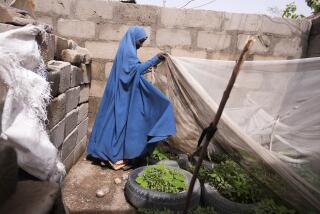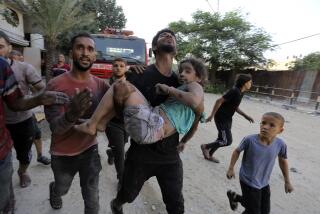Saving the Children
- Share via
The annual report on “The State of the World’s Children” was released by the United Nations Children’s Fund (UNICEF) today, a reminder again of the gravity of the condition of young people in developing nations but also of the extraordinary opportunity that exists to save their lives.
In the five years since UNICEF proposed a revolution of carefully targeted help in responding to the needs of children in Africa, Asia and Latin America there has been progress--the kind of progress that builds on itself, gains momentum, so long as it is fueled with adequate resources. That progress is measured by the spread of oral rehydration therapy, an inexpensive and simple remedy for the diarrheal diseases that are the principal killers of young children. It is measured by the commitment of nation after nation to the vaccination of young children, a program so compelling that it has brought warfare to a temporary halt even in places like Beirut while health teams have administered their life-saving mass vaccinations. It is measured by the better understanding of the importance of breast feeding in the early months of the life of a child, in village-level education on basic hygiene, nutrition, the importance of spacing births at least two years apart and of recognizing the signs of dangerous illness.
These programs, all of which are low in cost, already are saving the lives of 40,000 children each week, according to James P. Grant, the executive director of UNICEF, who added: “It has therefore been demonstrated that it is now possible to prevent most child deaths and most child malnutrition by means which any developing nation can afford to begin implementing and which every industrialized nation can afford to support.”
Against the significant progress, however, are statistics measuring the unfinished task: UNICEF estimates that the lives of 2.8 million children who died of diarrheal infection in the last year, 3 million of those who died of measles, tetanus and whooping cough, and most of the 2 million who died of respiratory infections could have been saved with prompt intervention of simple remedies and with just a little more knowledge on the part of mothers.
The entire effort is crippled by the deepening economic crisis facing the developing nations, the report emphasizes. The nations themselves have made their share of mistakes, but other factors are complicating the situation, including falling commodity prices, debt-service costs that are draining export earnings, and declining levels of aid.
Fortunately, the extraordinarily important role of UNICEF has won it continuing and expanding resources. This year the budget has been increased 8% to $500 million--81% contributed by governments, 19% from private sources, including the worldwide sale of UNICEF greeting cards. The United States contributes a disappointingly small share of the total--16% of the governmental support, far below the appropriate share measured on the basis of national wealth, and 15% of the private contribution. Those figures are fresh reminders of the slippage in what was once the compassionate generosity of the United States. But at least the U.S. governmental share for UNICEF has been paid promptly at a time when the American government is in arrears to almost all of the other international agencies and organizations, including the World Health Organization.
More to Read
Sign up for Essential California
The most important California stories and recommendations in your inbox every morning.
You may occasionally receive promotional content from the Los Angeles Times.










